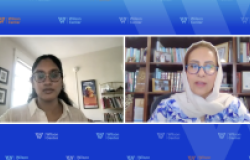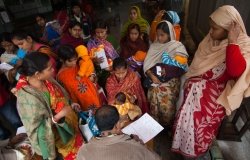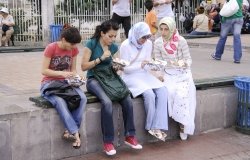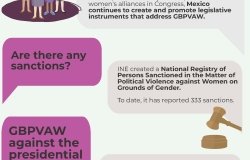Beyond the Magic Bullet: African Women and Their Long and Complex Quest for Gender Justice
Overview
Summary of a meeting with Zenebeworke Tadesse, Director of Publications, Forum for Social Sciences, Ethiopia, and Founding Member of the Association of African Women for Research and Development
Tadesse's talk was organized around two questions: First, what are the issues that inform the plight of African women in their search for gender equality? Second, why have past attempts at dealing with this question failed? To answer these questions she provided a broad overview of the paradigm shifts in development thinking and how these paradigms treated issues of gender equality and justice.
In the 1960s, she noted, the development arena emphasized women's education and training with the view that these opportunities would enhance women's participation in the modernization process. By the 1990s, however, most African countries had not reached these goals; except for southern Africa where gender parity in secondary schools is now a reality, the bulk of Africa still lags behind the rest of the globe.
In the 1970s, development specialists gave prominence to the Basic Needs Approach that prescribed state intervention to create employment in the informal economy and expand rural extension services and credit for women. This paradigm, she argued, was flawed because although agricultural development depends solely on women, there were no explicit attempts to invest in the care economy, especially labor saving devices that may reduce women's productive and reproductive burdens. Moreover, informal sector employment for most women became unsustainable with marginal profits.
African women suffered disproportionately in the 1980s with the advent of Structural Adjustment policies because they lessened the ability of governments to invest in education, health, and other essential services. By the 1990s, she noted, the wave of democratization in Africa seemed to open up avenues for women's participation. Democratization, however, has only benefited a narrow segment of women. In addition, although the entry of women in the policy arena was supposed to produce more gender-sensitive policies, the policymaking bodies in Africa no longer make significant decisions, particularly on economic issues. It is against this backdrop that African women activists are now trying to focus on influencing public sector expenditures. Furthermore, there is recognition that gender justice issues require multiple strategies, notably in democratization, the household, and campaigns against cultural practices such as early marriages, female genital mutilation, and the scourge of HIV/AIDS. In these efforts, African women are drawing from transnational networks that stem from globalization.
Gilbert Khadiagala, Director of Africa Project, 202/663-5681
Hosted By

Africa Program
The Africa Program works to address the most critical issues facing Africa and US-Africa relations, build mutually beneficial US-Africa relations, and enhance knowledge and understanding about Africa in the United States. The Program achieves its mission through in-depth research and analyses, public discussion, working groups, and briefings that bring together policymakers, practitioners, and subject matter experts to analyze and offer practical options for tackling key challenges in Africa and in US-Africa relations. Read more
Thank you for your interest in this event. Please send any feedback or questions to our Events staff.









